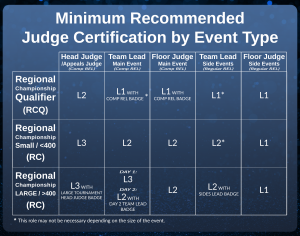With the announcement of Regional Championships and their Qualifiers, you may be looking forward to running more competitive local events! Once you’ve come to an arrangement with your Regional Tournament Organizer regarding what Qualifier events you might run, you’re going to need to find judges to manage the event operations.
Scheduling Your Event
Before you start staffing your event, you need to have it scheduled! Determine the date for your event as soon as you can, so that you can begin preparing for it. Ideally, you will have confirmed that a judge is available for the event before you lock in the date, so if you have a judge or group of judges you like working with, it can be a good idea to reach out to them before scheduling your event.
It’s also a good idea to keep an eye out for other events being run by other Local Tournament Organizers. Many stores may be running similar RCQs, and checking in with the Regional TO may let you know when their events are, so you can avoid overlapping. You could even consider running your event the day before or after another nearby TO, so players can have a concentrated weekend of competitive Magic!
Finding the Right Judges
With larger events, it’s a good idea to take a look at the Recommended Staffing Guidelines to figure out how many judges you need, and what distribution you should be looking at. For RCQs, having a Level Two or higher-level judge as your head judge is a strong foundation, and you can build up from there. You can also check in with your Regional TO and see if they have any additional recommendations or requirements for their qualifier events. Once you’ve locked in your head judge, you can talk with them and see if they have insight into the needs of the event – how many judges they think is appropriate or what the best structure for the staff are great questions to ask.
If you do staff level one judges for RCQs or RCs, we suggest only level one judges with the Competitive Policy badge, as that indicates they have proven their knowledge for competitive level events, like RCQs. All level two or higher judges have that knowledge as part of their certification process.

When looking for staff, a good first stop is your local community – talk with the judges who help you with your regular events at your shop, be they FNM or Prerelease, and see if there are any judges who are active on a community Facebook page or Discord.
You can absolutely also put together an event on JudgeAcademy.com and use that as a tool to solicit applications, and that may let you find judges you haven’t had the opportunity to work with before. When you’re looking at your applications, you can consider reaching out to the Regional TO or judges in your area to get further feedback and insight before making a determination. Furthermore, once you work with a judge, you can always pass feedback along to the Regional TO, especially if the judge who worked with you is interested in working at the Regional Championship.
Establishing a Professional Relationship
When you hire a judge to work an event for you, it’s important to have a conversation with them about expectations – in both directions. What do you expect them to do? The baseline expectation is to run the event the day of, but you may want help with planning the tournament structure, determining prize payout, selecting a format, or promoting the event. All of these are above and beyond the standard expectations. Furthermore, the judge will want to know what to expect from you, in terms of compensation, number of players, and how large their staff will be.
It’s critical to have these conversations earlier, rather than later so that any concerns or miscommunications can be handled with minimal disruption to the event. The biggest problems arise when both parties assume that someone else will take care of something fundamental, but never actually verify their expectations.
Once you establish a working relationship with some judges who help create the environment you’re seeking, you can continue to utilize them at events, or use their feedback to widen your network and work with more judges. If you have any questions about how to run your event, both the judges you’re working with and the Regional TO for your Regional Championship, can help guide you as necessary.



